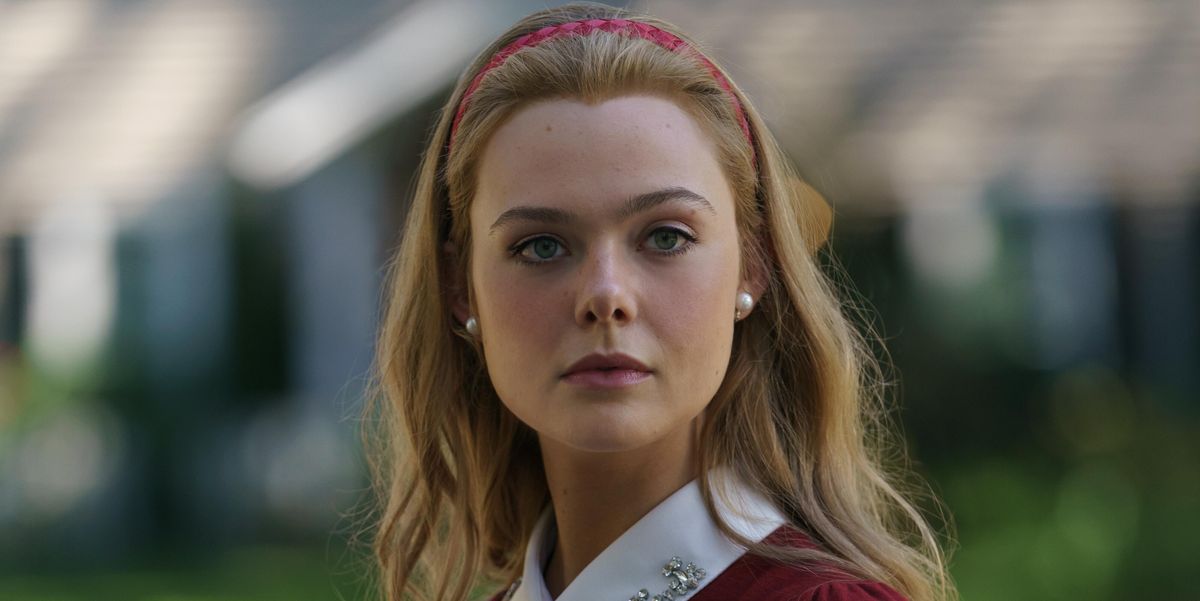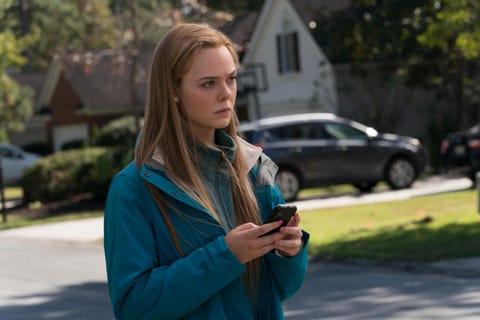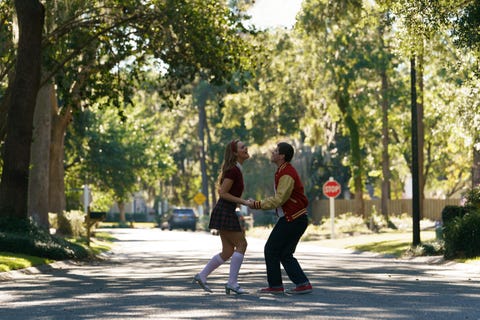Products You May Like
Spoilers ahead.
There’s no shortage of haunting, startling elements in Hulu’s The Girl From Plainville, which chronicles the story of Michelle Carter and the “texting suicide case” that made international headlines in 2014. In a controversial landmark verdict, Carter was sentenced to 15 months in prison for involuntary manslaughter, after sending text messages in which she encouraged her boyfriend, Conrad Roy III, to take his own life.
Created by Liz Hannah and Patrick McManus, The Girl From Plainville insightfully explores teenage isolation, suicidal ideation, and the sticky dynamics of digital relationships. And then there’s Glee, the Ryan Murphy high school musical that plays an unexpectedly outsized role in the show. As reported by Esquire in the story that inspires the series, Carter was a devoted fan of the show and specifically of Lea Michele’s try-hard outsider character Rachel Berry, and would use her dialogue word-for-word in texts. Specifically, after Roy’s death, she quoted scenes from the 2013 tribute episode in which Rachel mourns the death of her boyfriend Finn, whose actor Cory Monteith had really died that summer. To quote Esquire writer Jesse Baron, “because nothing like this had ever happened to her, she had to build the framework from the materials at hand, culled from white-teen culture.”
The series leans hard into Carter’s unsettling fandom, to demonstrate how blurred the lines between fantasy and reality had become in her mind. In episode 4, which premiered Tuesday, Elle Fanning’s Michelle retreats into fantasy to cope as the case against her gathers steam. She imagines herself and Conrad (Colton Ryan) as Rachel and Finn, performing a full song-and-dance number to REO Speedwagon’s “Can’t Fight This Feeling,” which Monteith memorably covered early in the show. It’s an unexpected change of pace and tone, a moment of escapism that’s both tongue-in-cheek and devastating.
Below, Fanning discusses this scene and the show’s use of Glee, and also delves into the psychology of Michelle, why she was initially cautious about taking the role, and how the show strives to avoid glamorizing suicide.
What was your impression of Michelle before taking the role, and how did that impression change over time?
I do remember paying attention to the case because it was people around my age, and it was a very modern story that could only happen now, because it was all about phones. And I could relate to that feeling of false reality that we create for ourselves, and the instant gratification. In high school, I had social media and phones and you’re waiting for that text back; your whole world is on your phone. I mean, my whole world is still on my phone. So I could understand how the lines of fantasy and reality were blurred, which we play with a lot in the show.
I think I was 19 when the court case was happening, so I wasn’t following it obsessively, but I do remember seeing her face flashed on the TV, and this very one-sided, one-dimensional view of her. That she was a black widow, a manipulator, and that Conrad was the victim in her schemes. And he very much was a victim, and it ended in the worst way possible, but at the same time, he was painted in a very one-dimensional way too. We didn’t get to know him as the young man that he was. The media likes to villainize young women a lot of the time, and it felt like that was happening. I don’t know if I had the wherewithal to know that, at that time–I probably bought into it a little bit.
I did too. I think when you read the texts she sent to him with no context, they’re irredeemable. It’s hard to come to any conclusion other than “this person is a sociopath.” But then you learn more about the situation.
Yeah, as I learned more and watched the documentary [HBO’s I Love You, Now Die] and read the Esquire article, I did see it in a new way, and had a greater understanding on both sides. In order to play the character over those months, you don’t have to agree with what she did or like her, but you can’t judge her. You have to understand how she got there, as horrible as what she said was. I read through all the text messages and everything, but yeah, you have to have an understanding.
You mentioned the ways the media likes to villainize young women. There’s this sense that they have these magical powers of coercion, and with Michelle, she was depicted as this ice queen who would do anything to be popular.
Yeah, completely. I was even thinking about Amanda Knox … There’s something about young women, in courtroom situations or what have you, there’s always someone who wants to say that they should be acting another way. Oh, they’re not sad enough, they’re not angry enough, they’re not doing this properly. Even just in life, that’s something that all women deal with day to day, the sense that you’re not doing it right. Especially if you’re in the public eye, it’s heightened even more. Like, oh, that photo, she looks this way so she obviously must be a bitch. It’s also people that have never been in those situations, that are telling people how they should act. You don’t know how you’re emotionally going to react to something, or what you’re actually feeling. It feels like now people are starting to talk more about these things, how the media has portrayed young women. With these conversations about Janet Jackson and Britney Spears, it feels like maybe it’s starting to come out a little more.
I didn’t expect to root for her as much as I do in the show. I think the feeling of being socially excluded as a teenage girl is so universal, a lot of people can probably relate at least to that aspect of her.
Oh yeah, and we really wanted to try and show the story from an unbiased perspective. We follow a lot of different characters, we show the exploration of grief, with Chloe’s character, and we didn’t want to sensationalize suicide in any way. And then with the social exclusion, Michelle, in real life, loved Glee. That was what clicked with me. I could understand how you’re someone who feels lonely, you feel excluded in your school, there’s these mean girls, you’re going through a hard time, you’re trying to figure out who you are, you’re kind of wearing different masks, trying out different personalities for yourself … and with a show like Glee, it was so amazing for outsiders. It created a sense of community, it’s this group of misfits that all get to be together and feel accepted. So that’s a wonderful thing, but I think Michelle really took that to heart, in sometimes not living with the consequences of what could happen. In not being grounded, and kind of living in this fantasy state. Because they [Michelle and Conrad] only saw each other like a handful of times, everything was over text. You get wrapped up in that.
The Glee of it all is so interesting. What was it like to shoot that dance sequence in episode 4?
We knew we wanted it to feel poppy, in the way it was shot, the colors and the costumes, and we were dressed like the characters in the show. Colton, who plays Conrad, he’s incredible and he comes from a musical theater background. He’s been on Broadway and he’s a singer, so that was right in his element. We wanted it to feel very different than the everyday reality of the show, and the heaviness of that. It’s such a light moment, but it also is quite heartbreaking. Whenever there are those fantasy moments of them together, there’s a lightness, and with that lightness you can’t think about the tragic end. So even in those moments, it’s still heavy, but you get to live inside of Michelle’s head, in a way.
It feels like an extension of the way the text messages are depicted, where they’re actual conversations between Michelle and Conrad.
Yeah, I love how they played with fantasy, because there’s no other way to really do it. Especially with texts, it’s very boring and un-cinematic to watch someone text on the couch. It’s like, this is a texting show, how do we make this interesting? To have the fantasy of us together, really playing out those scenes, you can see the chemistry and our relationship and how it grew, and that was such a great device. There’s really no other way to do it; it would have been quite boring. And when you’re texting, you can kind of be whoever you want to be, but still at the same time, you’re feeling all of the emotions, and the impact of your words, it’s still there. Which, maybe people don’t realize. Bullying is so much easier to do when it’s not to someone’s face.
That brings up what is, I guess, the great unanswered question here. How did Michelle go from being so supportive and loving towards Conrad, to texting him the things that she did on the night he died?
It’s so hard to know. I don’t have any of the answers. I didn’t get to speak to her, and of course you are playing a real person so you feel a responsibility, but then at the same time you have to kind of remove yourself, and play the scenes, and figure out the arc of the character, rather than dwelling on answering these questions that we’re never going to answer. But for me, I think it just was really bad timing, and two people that maybe should have never met. They sadly didn’t bring out the best in one another. There are signs that people are hurting that we might never catch or never see, but I think that’s because mental health is still so taboo, and if this show kind of pushes the conversation forward to have more people talk about it, then that would be a great thing. To encourage people to ask for help, to see those signs. But especially on phones, people are very secretive, you can hide a lot of things, and it’s no-one’s fault if they don’t catch it, either.
We tried not to romanticize or sensationalize [suicide] at all … It wasn’t an immediate yes, to come onto this. I wanted to make sure that it was done in the right way. There’s definitely ways it could be done in a way that wouldn’t be helpful. If we just keep talking about it, just normalize it, maybe not everyone will feel as weird about having those feelings.
This interview has been edited and condensed for clarity.
If you or someone you know needs help, support is available at the National Suicide Prevention Hotline at 1-800-273-8255.
This content is created and maintained by a third party, and imported onto this page to help users provide their email addresses. You may be able to find more information about this and similar content at piano.io


